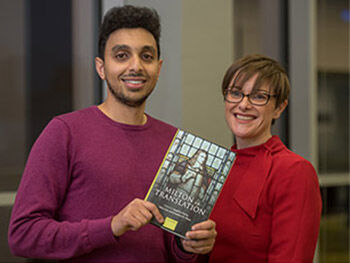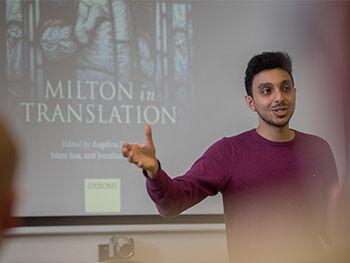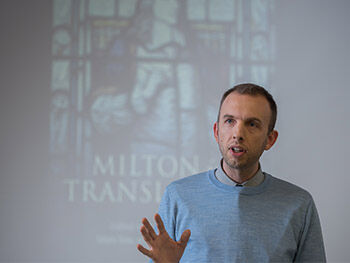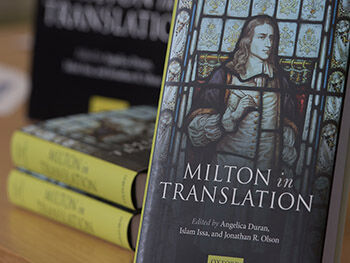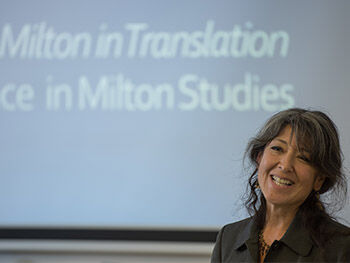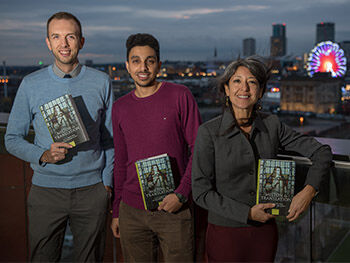University News Last updated 08 December 2017
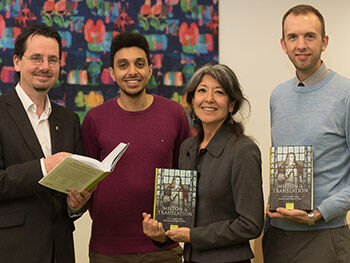
On the evening of 6 December, the School of English at Birmingham City University hosted an illustrious event, the launch of landmark book, “Milton in Translation.” The world’s first detailed research into how Milton has been translated and read across the world, co-edited by Islam Issa, lecturer in English Literature at the University.
The event was attended by staff and students, both past and present and allowed the three co-editors, Islam Issa, Professor Angelica Duran of Purdue University, USA and Dr. Jonathan R Olson of Grand Canyon University, to tell the stories of their involvement in the book and of their love for the works of Milton.
Islam told the audience why, in his opinion, translation is important to the world of literature.
After the event, we spoke to Islam about his involvement in the book and what the works of Milton mean to him personally.
1. How did you become involved in the project?
The inspiration for this book came in 2012 when Tokyo hosted hundreds of scholars at the 10th International Milton Symposium. It was the first time the gathering had been held outside Europe or North America and signalled very clearly how international Milton had become. Straight after it, I began to plan Milton in Translation with Hugh Adlington, who was my PhD supervisor. Although he played a key part in developing the idea in its earliest stages, he didn't actually contribute formally to the book, so that’s why it’s dedicated to him!
2. Can you explain what exactly the book offers the reader?
This book combines new essays about what Milton means around the world, from the seventeenth century right until today. It does so, mainly, by looking at how he has been translated. Each chapter looks at a language and offers a brief history of relevant translations, anecdotes about the historical context of these translations, and then a case study, which might be to do with the translator’s background or the historical context in which the translation happened, and so on. The book has over twenty such chapters from around the world: from Europe to Latin America to the Middle East to East Asia. It goes from languages as influential as Latin, German, and French, to less expected ones like Estonian, Icelandic, and Korean. The expert contributors come from all around the world. Some are literary scholars, others are in translation studies, and some are themselves renowned translators of Milton's work.
3. How long did the process take?
It took almost five years from planning until publication. We started planning in 2012. It was a long process because it wasn't just research and writing, but required developing the concept, inviting the co-editors (Angelica Duran and Jonathan Olson), finding the best contributors for each chapter, proposing the book to Oxford University Press, and so on. Even when everything was almost ready, we decided to ask different scholars around the world to check the translations and transliterations in the chapters for us because we're definitely not proficient in all of the languages covered!
4. Were you surprised by what you discovered?
Honestly, every chapter had at least one surprise. In general, though, we were surprised at just how many languages Milton’s been translated into; we discovered at least 57. Also, how current he seems to be, so there was more translation of his work in the last 30 years than the previous 300. But most exciting for me was how there were so many common trends globally. Translation is so closely linked to social, political, and religious contexts, and these affect when, why and how the translation happens, as well as the way people respond to it. One example is that at completely different times and in completely different cultures, the same sexual scenes were censored in translation. Another example is that translators and readers going through independence, also in completely different places and times, took interest in Milton’s revolutionary ideas. My favourite story in Milton in Translation, though, is about the Serbian translation which Milovan Djilas, a communist party official and one-time vice-president of Yugoslavia, began writing in prison. He hid his tiny pencil from the guards inside an orange and wrote on toilet paper!
5. How did it feel to be collaborating with the other scholars?
The collaboration wasn't without its challenges, especially that we were dealing with so many scholars and from all around the world. There were over fifty in total and each could have a different culture of communication, scholarship, writing style, and in fact, time-zone! But meeting new people and getting to know different cultural practices has to be one of the most exciting and enlightening parts of the process.
6. Why is this project so important?
About fifty years ago, W. R. Parker, a respected Milton biographer, wrote that "a good book on the translating of Milton into other languages (and his influence on other literatures) is long overdue". This is that book. Not only does it provide the facts about the translations, but it also shows how important it is to look beyond the English-speaking world in generally to understand the extent of cultural influence and exchange. It's important to me that it brings different identities into the mainstream conversation as equals and demonstrates their vital role in helping us understand literature, politics, and so much more.
7. What impact do you feel the book will have on future generations?
I hope this book will be indispensable to those studying how literature is transformed and appropriated in different cultures and contexts. I also hope that it might symbolise the increasingly global nature of literary scholarship, not just through the contributors, but through the range of topics and cultures discussed. With so much tension in the world, it's quite a nice change to talk about positive things like the concept of global citizenship and community.
8. What is it about Paradise Lost and Milton’s works that speaks to you and made you want to explore further?
Paradise Lost asks the most universal questions imaginable - big ones too, about life and death, relationships and hierarchies, choices and consequences, and so much more. It's these real-life, universal themes, really. And I'm still gripped to the epic poem because it keeps surprising me with new concepts and ideas. As for Milton, he's quite a contentious figure, so to name just a few things, he speaks out against censorship, opposes the powerful monarchy, and says that poetry shouldn't rhyme. Milton wasn't one to accept what he was told and developed his own ideas at a time when conformity of all sorts was expected and those in power didn't really represent the people. The intriguing thing is, it sounds a lot like today.
You can read more about the creation of the book and Islam’s involvement here.
Find out more about the courses on offer within the School of English.
